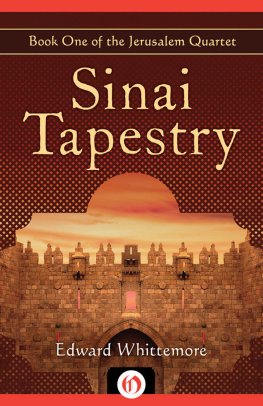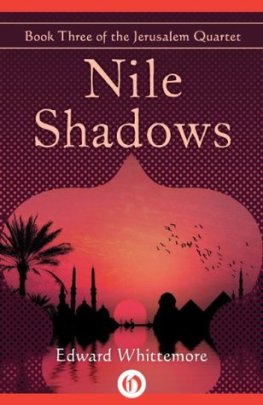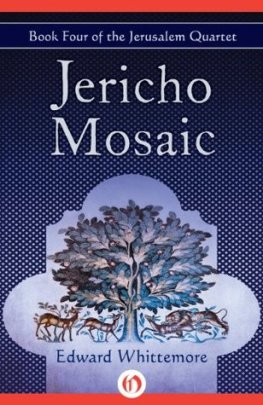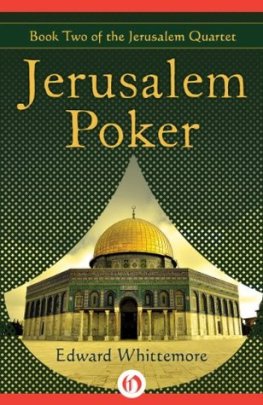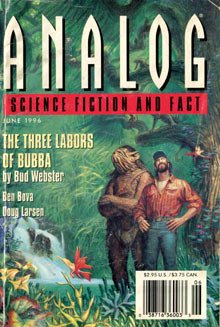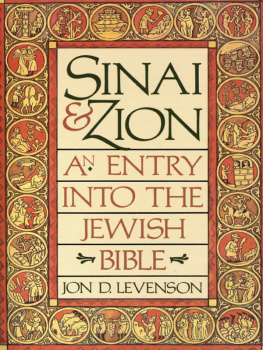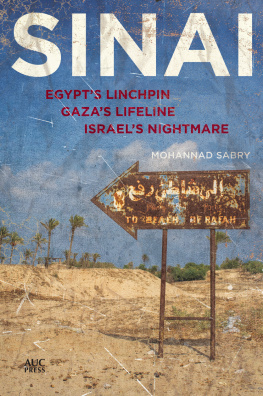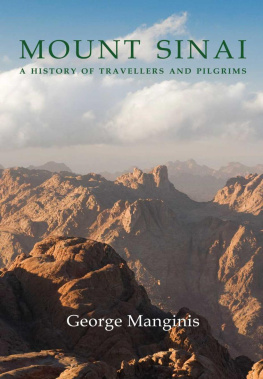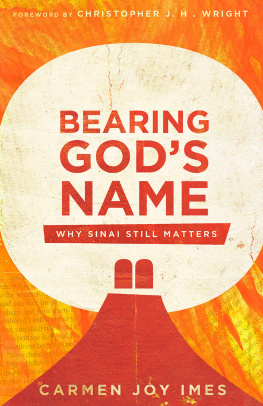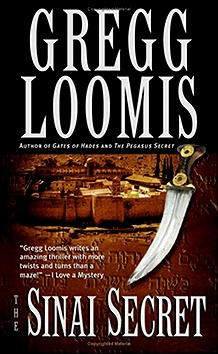Edward Whittemore
Sinai Tapestry
Edward Whittemore (19331995). Foreword by Tom Wallace
SOME TWENTY YEARS AFTER the end of the war with Japan a freighter arrived in Brooklyn with the largest collection of Japanese pornography ever assembled in a Western tongue. The owner of the collection, a huge, smiling fat man named Geraty, presented a passport to customs officials that showed that he was a native-born American about as old as the century, an exile who had left the United States four decades before. Thus begins Quins Shanghai Circus; it ends with the largest funeral procession held in Asia since the thirteenth century.
The year was 1974, the author of Quins Shanghai Circus, Edward Whittemore, a forty-one-year-old former American intelligence agent; he and I had been undergraduates at Yale back in the 1950s, but then we had gone our separate ways, he to the Marines and then the CIA and I to a career in book publishing in New York City. Needless to say, I was pleased that my old Yale friend had brought his novel to me and the publishing house of Holt, Rinehart and Winston where I was editor-in-chief of the Trade Department. I was even more delighted when the reviews, mostly favorable, started coming in, capped by Jerome Charyn in The New York Times Book Review: Quin was a profoundly nutty book full of mysteries, truths, untruths, idiot savants, necrophiliacs, magicians, dwarfs, circus masters, secret agents a marvelous recasting of history in our century.
In the next fifteen years Whittemore went on to write four more wildly imaginative novels, his Jerusalem Quartet: Sinai Tapestry, Jerusalem Poker, Nile Shadows, and Jericho Mosaic. Reviewers and critics compared his work to the novels of Carlos Fuentes, Thomas Pynchon, and Kurt Vonnegut. Publishers Weekly called him our best unknown novelist. Jim Hougan, writing in Harpers Magazine, said Whittemore was one of the last, best arguments against television He is an author of extraordinary talents The milieu is one in which readers of espionage novels may think themselves familiar, and yet it is totally transformed by the writers wild humor, his mystical bent, and his bicameral perception of time and history.
Edward Whittemore died from prostate cancer in the summer of 1995 at the age of sixty-two, not much better known than when he began his short, astonishing writing career in the early 1970s. His novels never sold more than 5000 copies in hard covers, three were briefly available in mass market paperback editions. But the Quartet was published in Great Britain, Holland, Spain, Italy, Greece, Scandinavia, Russia, Poland, and Germany where Whittemore was described on its jacket as the master American storyteller. The jacket on the Polish edition of Quins Shanghai Circus was a marvelous example of Japanese erotica.
Whittemore graduated from Deering High School, Portland, Maine in June 1951 and entered Yale that fall, a member of the Class of 1955. Another Yale classmate, the novelist Ric Frede, labeled Yale undergraduates of the 1950s members of the Silent Generation. The Fifties were also the Eisenhower Years, that comfortable period between the Second World War and the radicalism and the campus unrest of the 1960s. Ivy League universities were still dominated by the graduates of New England prep schools. Sons of the East Coast establishment, they were closer to the Princeton of F. Scott Fitzgerald and the Harvard of John P. Marquand than the worlds of Jack Kerouac and Allen Ginsberg. They were gentlemen and athletes but not necessarily scholars. Often after receiving gentlemanly Cs at Yale and the other Ivys, they went on to careers on Wall Street or in Washington; to the practice of law, medicine, or journalism. They entertained their families and friends on the playing fields of Yale as well as at Morys. They ran The Yale Daily News, WYBC (the campus radio station), The Yale Record (the humor magazine), The Yale Banner (the year book), and sang in various Yale music groups. They were usually members of a fraternity and were tapped by one of the six secret Senior Societies.
By the Yale standards of the day, Whittemore was a great success, a high school boy who made it. Affable, good-looking and trim, he presented a quizzical smile to the world. He casually wore the uniform that was in: herringbone tweed jacket, preferably with patches at the elbow, rep tie, chinos and scruffy white buck shoes. In a word, he was shoe (short for white shoe, a term of social approval). He was not much of an athlete, but he was a member of Zeta Psi, a fraternity of hard-drinking, socially well-connected undergraduates. At the end of Junior year he was tapped for Scroll and Key.
But his real distinction was that he was the Managing Editor of the 1955 Yale News Board at a time when News chairmen and managing editors were as popular as football team captains and the leading scholars of the class. During the immediate postwar years and the 1950s the Yale News produced such prominent writer-journalists as William F. Buckley, James Claude Thomson, Richard Valeriani, David McCullough, Roger Stone, M. Stanton Evans, Henry S.F. Cooper, Calvin Trillin, Gerald Jonas, Harold Gulliver, Scott Sullivan, and Robert Semple. They would make their mark at The New York Times, The New Yorker, Time, Newsweek, The National Review, Harpers, and the television networks, and go on to write many books.
I met Ted early in the spring of Freshman year. We were both heeling the first News comp, and as was usually the case with survivors of that fierce competition to make the News, we remained friends throughout our years at Yale. It was assumed by many of us on the News that Ted would head for Wall Street and Brown Brothers Harriman, a blue-chip investment firm where Old Blues from Scroll and Key were more than welcome and where Teds older brother later was a partner. Or at the very least, he would get on the journalistic fast-track somewhere in the Time-Life empire founded by an earlier News worthy, Henry Luce.
But we were wrong. Whittemore, after a tour of duty as an officer in the Marines in Japan, was approached there by the CIA and spent the Kennedy years working for the Agency in Europe. During those years Whittemore would periodically return to New York City. What are you up to? one would ask. Oh, this and that. For a while he was running a socialist newspaper in Rome. After he left the Agency there was a stint with the Addiction Services Agency in New York City. Later, there were rumors that he had a drinking problem and that he was taking drugs. He married and divorced twice. He and his first wife had two daughters. And then there were the women he lived with after the second divorce. There were many; they all seemed to be talented painters, photographers, writers, sculptors, and dancers. There were more rumors. He was living on Crete, he had no job, no money, he was writing. Then silence. Clearly, the fair-haired undergraduate had not gone on to fame and glory.
It was not until 1972 or 1973 that Ted surfaced in my life. He was back in New York on a visit. On the surface he appeared to be the old Ted. He was a little rumpled, but the wit, the humor, the boyish charm were still there. Yet he seemed more thoughtful, more reflective, and there was Carol, a woman with whom Ted had become involved while in Crete and with whom he seemed to be living. He was more secretive now. And he had the manuscript of a novel he wanted me to read. I thought the novel was wonderful, full of fabulous and exotic characters, brimming with life, history, and the mysteries of the Orient. The novel that came to be called Quins Shanghai Circus

